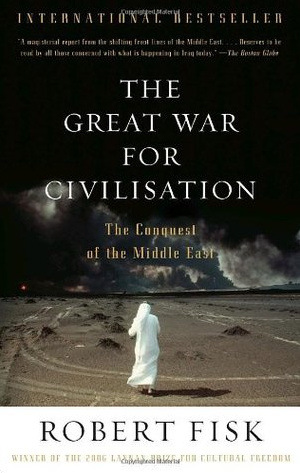

Robert Fisk · 1136 pages
Rating: (3.6K votes)
“Terrorism” is a word that has become a plague on our vocabulary, the excuse and reason and moral permit for state-sponsored violence— our violence—which is now used on the innocent of the Middle East ever more outrageously and promiscuously. Terrorism, terrorism, terrorism. It has become a full stop, a punctuation mark, a phrase, a speech, a sermon, the be-all and end-all of everything that we must hate in order to ignore injustice and occupation and murder on a mass scale. Terror, terror, terror, terror. It is a sonata, a symphony, an orchestra tuned to every television and radio station and news agency report, the soap-opera of the Devil, served up on prime-time or distilled in wearyingly dull and mendacious form by the right-wing “commentators” of the American east coast or the Jerusalem Post or the intellectuals of Europe. Strike against Terror. Victory over Terror. War on Terror. Everlasting War on Terror. Rarely in history have soldiers and journalists and presidents and kings aligned themselves in such thoughtless, unquestioning ranks.”
― Robert Fisk, quote from The Great War for Civilisation: The Conquest of the Middle East
“Soldier and civilian, they died in their tens of thousands because death had been concocted for them, morality hitched like a halter round the warhorse so that we could talk about 'target-rich environments' and 'collateral damage' - that most infantile of attempts to shake off the crime of killing - and report the victory parades, the tearing down of statues and the importance of peace.
Governments like it that way. They want their people to see war as a drama of opposites, good and evil, 'them' and 'us', victory or defeat. But war is primarily not about victory or defeat but about death and the infliction of death. It represents a total failure of the human spirit.”
― Robert Fisk, quote from The Great War for Civilisation: The Conquest of the Middle East
“Governments like it that way. They want their people to see war as a drama of opposites, good and evil, “them” and “us,” victory or defeat. But war is primarily not about victory or defeat but about death and the infliction of death. It represents the total failure of the human spirit.”
― Robert Fisk, quote from The Great War for Civilisation: The Conquest of the Middle East
“For ‘terrorists’, read ‘guerrillas’ or – as President Ronald Reagan would call them in the years to come – ‘freedom fighters’. Terrorists, terrorists, terrorists. In the Middle East, in the entire Muslim world, this word would become a plague, a meaningless punctuation mark in all our lives, a full stop erected to finish all discussion of injustice, constructed as a wall by Russians, Americans, Israelis, British, Pakistanis, Saudis, Turks, to shut us up. Who would ever say a word in favour of terrorists? What cause could justify terror? So our enemies are always ‘terrorists’. In the seventeenth century, governments used ‘heretic’ in much the same way, to end all dialogue, to prescribe obedience.”
― Robert Fisk, quote from The Great War for Civilisation: The Conquest of the Middle East
“And so we watched the fire blaze through the pageant of stars and illuminate the firmament above us.”
― Robert Fisk, quote from The Great War for Civilisation: The Conquest of the Middle East

“You must pray to God for forgiveness because I can give you none”
― Alison Weir, quote from Innocent Traitor
“Per Sherlock Holmes ella è sempre la donna. Raramente l’ho sentito accennare a lei in altro modo. Ai suoi occhi, supera e annulla tutte le altre esponenti del suo sesso.”
― quote from A Scandal in Bohemia (The Adventures of Sherlock Holmes, #1)
“Thwart," I said. "To prevent someone from accomplishing something by means of visiting gratuitous violence upon his smarmy person."
"I'm pretty sure that isn't the definition." Sarissa said.
"It is today.”
― Jim Butcher, quote from Cold Days
“Oxygen flooded into the atmosphere as a pollutant, even a poison, until natural selection shaped living things to thrive on the stuff and, indeed, suffocate without it.”
― Richard Dawkins, quote from The Greatest Show on Earth: The Evidence for Evolution
“One of the first lessons a warrior is taught is that denial of one's circumstances only results in failure to recognize real danger.”
― Karen Marie Moning, quote from The Highlander's Touch
BookQuoters is a community of passionate readers who enjoy sharing the most meaningful, memorable and interesting quotes from great books. As the world communicates more and more via texts, memes and sound bytes, short but profound quotes from books have become more relevant and important. For some of us a quote becomes a mantra, a goal or a philosophy by which we live. For all of us, quotes are a great way to remember a book and to carry with us the author’s best ideas.
We thoughtfully gather quotes from our favorite books, both classic and current, and choose the ones that are most thought-provoking. Each quote represents a book that is interesting, well written and has potential to enhance the reader’s life. We also accept submissions from our visitors and will select the quotes we feel are most appealing to the BookQuoters community.
Founded in 2023, BookQuoters has quickly become a large and vibrant community of people who share an affinity for books. Books are seen by some as a throwback to a previous world; conversely, gleaning the main ideas of a book via a quote or a quick summary is typical of the Information Age but is a habit disdained by some diehard readers. We feel that we have the best of both worlds at BookQuoters; we read books cover-to-cover but offer you some of the highlights. We hope you’ll join us.